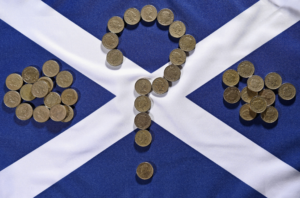The New Scottish Pound: A Haggis Stand at a Vegan Party?
Posted by Colin Lambert. Last updated: May 3, 2021
In late February, The Full FX’ Asian correspondent Tse-Sing Gweilo argued the case for a break down in the Hong Kong dollar peg, well now that writer’s Scottish cousin is weighing in on another potential currency market issue – a Scottish pound post-independence.
This Thursday (6 May) Scotland goes to the polls and, for the first time since 2014, an independence referendum is on the table. There is, however, one understated yet critical difference between then and now, and that is the nationalists’ attitude towards a new locally minted Scottish pound (let’s call it the SCP).
Back in 2014 the preference of the Scottish Nationalist Party (SNP) was a currency union with a seat on the board of the Bank of England, something that received short shrift in London, and still does. The alternative? In 2021 former SNP leader Alex Salmond proposed the UK pound be replaced (I wonder if his preference is Russian roubles?).
Given the 2014 experience such a policy seems the logical half-way house to eventual adoption of the euro, a virtual necessity in an EU-bound Scotland.
A national currency is the ultimate expression of sovereignty, its fiscal standing vis-à-vis other currencies marking it as the bellwether of global standing. So how could the rest of the world value a free-floating SCP?
Well, a SCP would definitely conjure up serious challenges, with the likelihood being, after starting at par with the GBP, things going south (literally) fast. The reasons are not hard to divine and are at three levels, fiscal, economic and government investment – the SNP will also be unable to mask incompetence by relying upon its position in the broader UK as it has previously.
Firstly, fiscally, Scotland generates £66 billion in revenue, but spends £81 billion via UK transfers, though there is the argument that oil and gas in the past balanced this out. This is problematic because oil and gas are finite, and much of these commodities – plus a lot of fish – lie in Orkney and Shetland waters, islands which are less keen on being run by Edinburgh than from more distant London. So not only would Scotland have to find an additional £1,941 per person per annum, it could also lose a substantial percentage of its offshore assets.
Furthermore, in August 2020, the Scottish government deficit hit 8.6% of GDP, 6% higher than the UK, and far higher than the EU is likely to accept, even in these days of Covid. This does not even take into account dividing up the UK national debt, or the ability of Edinburgh to borrow at lower rates thanks to the UK’s sovereign rating.
Any tax increases would most certainly hit businesses and high-income earners given SNP’s socialist tendencies.
The EU wants and needs net payers, not, another cohesion fund state.
Secondly, in 2017, Scotland exported £81.4 billion of goods, of which 60% went to the rest of the UK, and only 18% to the EU. The inevitable hard border, a function of the process needed even before re-joining the EU, across Hadrian’s Wall would hit Scotland particularly hard – initially by hitting Scotland’s exports to its largest external market, but also because goods travelling to the EU would hit a hard border first at Berwick, and then once again at Dover. Recent Brexit/EU paperwork woes would simply be magnified. The alternative, Ireland style ferry services, are not favourable to Scotland thanks to geographical location, with the last route between Rosyth and Zeebrugge running back in 2010.
Thirdly, government investment. The UK has heavily invested in defence north of the border, the Clyde Shipyards, Babcock at Rosyth, major airbases, and recently the Valneva vaccine plant in Livingstone as examples. There is no incentive for this to continue.
A weak SCP appears the likeliest outcome and this cannot be welcome to an EU right in the middle of trying to work out how to pay for long term COVID recovery initiatives, and needing every penny it can get. The EU wants and needs net payers, not, another cohesion fund state.
Restoration of a hard currency can come with the SCP’s own replacement by the euro with the irony of Scotland’s voice being a lot weaker in Brussels, Frankfurt, Berlin, and Paris than it is currently in London.
Then again if the SCP were a Vegan Haggis?
Tse-Sing MacGweilo
